JACKIE CHAN
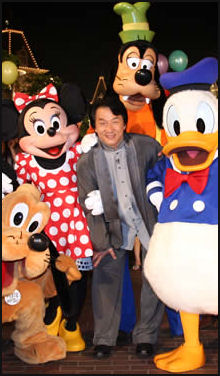 Jackie Chan was the first significant action hero and martial arts performer to emerge from Hong Kong after the death of Bruce Lee in 1973. Drunken Master (1978), which mixed slapstick comedy with martial arts and was directed byYuen Woo-ping, was a financial success and made Jackie Chan a major Hong Kong movie star. The films of Jackie Chan and Sammo Hung integrated techniques from Peking Opera, which both had trained in prior to their work as stuntmen and extras in the Hong Kong studio system.
Jackie Chan was the first significant action hero and martial arts performer to emerge from Hong Kong after the death of Bruce Lee in 1973. Drunken Master (1978), which mixed slapstick comedy with martial arts and was directed byYuen Woo-ping, was a financial success and made Jackie Chan a major Hong Kong movie star. The films of Jackie Chan and Sammo Hung integrated techniques from Peking Opera, which both had trained in prior to their work as stuntmen and extras in the Hong Kong studio system.
Jackie Chan is arguably the most well-known, working Hong Kong actor and the man who best personifies Hong Kong action movies. Chan has a huge cult following and some people argue that he is the most popular movie star in the world. “Drunken Master” made him a star.
Jackie Chan is perhaps Asia’s wealthiest and best-known entertainer. He was the biggest box office draw in Asia and became and reasonably big star in Hollywood too. He has appeared in more than 100 films since his debut in 1962 as an extra and stuntman. In the 2000s he was highest paid Asian actor, earning at least $15 million per film.
Chan was among 25 people chosen by Time magazine as “Asia’s greatest living heroes.” Richard Corliss of Time wrote that while Bruce Lee “exuded blinding rage” Chan "was all smiles, a joker as well as a fighter” and “a brilliant choreographer of his own unkillable body.” Chan first rose to fame in the United States among the video-store, couch-potato set in the late 1980s and the early 1990s. In 1995, he was presented an MTV Lifetime Achievement Award by Quentin Tarantino.
See Separate Articles: MARTIAL ARTS FILMS: WUXIA, RUN RUN SHAW AND KUNG FU MOVIES factsanddetails.com ; FAMOUS CHINESE FILM ACTORS, CHOW YUN-FAT AND FOREIGN ACTORS IN CHINA ; ; FAMOUS CHINESE FILM ACTRESSES: GONG LI, ZHANG ZIYI AND OTHERS factsanddetails.com ; FAMOUS ACTRESSES IN THE EARLY DAYS OF CHINESE FILM factsanddetails.com ; BRUCE LEE: HIS LIFE, LEGACY, KUNG FU STYLE AND FILMS factsanddetails.com ; JET LI factsanddetails.com ; HONG KONG MOVIE INDUSTRY: ACTION, TRIADS AND GHOSTS factsanddetails.com ; HONG KONG FILM MAKERS: JOHN WOO, WONG-KAR-WAI, TSUI HARK AND STEPHEN CHOW factsanddetails.com
Websites: Love Hong Kong Film lovehkfilm ; Hong Kong Cinemagic hkcinemagic.com ; Hong Kong Movie Database hkmdb.com; Martial Artist’s Guide to Hong Kong Films magthkf.ronlim.com ; Chinese Film Classics chinesefilmclassics.org ; Senses of Cinema sensesofcinema.com; 100 Films to Understand China radiichina.com. dGenerate Films is a New York-based distribution company that collects post-Sixth Generation independent Chinese cinema dgeneratefilms.com; Internet Movie Database (IMDb) on Chinese Film imdb.com ; Wikipedia List of Chinese Filmmakers Wikipedia ; Shelly Kraicer’s Chinese Cinema site chinesecinemas.org ; Modern Chinese Literature and Culture (MCLC) Resource List mclc.osu.edu ; Love Asia Film loveasianfilm.com; Wikipedia article on Chinese Cinema Wikipedia ; Film in China (Chinese Government site) china.org.cn ; Directory of Interent Sources newton.uor.edu ; Chinese, Japanese, and Korean CDs and DVDs at Yes Asia yesasia.com and Zoom Movie zoommovie.com ; Bruce Lee, the Divine Wind bruceleedivinewind.com ; Jackie Chan Official Site jackiechan.com ; ; Wikipedia article on Jackie Chan Wikipedia
RECOMMENDED BOOKS: Jackie Chan Autobiography:“I Am Jackie Chan: My Life in Action” Amazon.com; “Chinese Film Stars” by Mary Farquhar and Yingjin Zhang Amazon.com; “Legacies of the Drunken Master” by White Amazon.com; “Never Grow Up” by Jackie Chan, Daxing Zhang, et al. Amazon.com; “Police Story/Police Story 2" (Blu-ray) Amazon.com; “Drunken Master II: Amazon.com;
Jackie Chan's Early Life
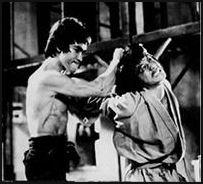
Early role in Bruce Lee film
Jackie Chan was born Chan Kong-sang in 1954 after reportedly spending a year inside his mother's womb. He weighed 5.5 kilos at birth and was delivered by a caesarean section. Chan said his father didn't have enough money to pay for the $200 operation and offered his son as payment. Friends intervened and lent him the money.
Chan's father's Charles was a cook and his mother was maid for a French diplomat. Jackie didn't know until he was an adult that his father had been married before and had three sons who were lost during the Japanese occupation. Charles met Jackie's mother, Lee-lee, in Shandong and together they made their way to Hong Kong.
Chan was an only child. As a boy he was called Pao-pao (Cannonball). The trials that Jackie Chan endures in his films are not unlike ones that he has suffers through in real life. His family was so poor that his father ate little else but tofu for two years so he could pay back his debts.
Jackie was brought up in the French Embassy on Victoria Hill in Hong Kong. He said, "I would cry a lot, and my mom would have to take me in the middle of the night so I wouldn't wake anyone.” A friend told Jackie’s parents about the China Drama Academy.
Jackie Chan at the China Drama Academy
Chan entered the China Drama Academy, a training school of the Peking Opera, at the age of seven. He spent over a decade enduring torturous instruction in acrobatics, gymnastics, mime, singing, dance, and martial arts under the taskmaster Ju Yu-Yim-yuen along with other future action movie stars like Yue Wah, Yuen Biao and Samo Hung.
Chan’s kung fu training included throwing 1,000 punches in a row and then launching 500 kicks. He often did handstands on chairs and did an average of 5,000 punches and kicks a day. His singing and acting lessons were equally rigorous.
At the school, Chan slept only five hours a night in a dormitory with 50 boys and girls. The children were given little to eat and on often beaten. Describing his first beating, "I remember dropping a piece of rice on the floor, and the teacher caned me." He added, "I was beaten almost every day. I never forgot how it felt. It made me never want to hit anyone. I don’t want children to think it's okay to beat someone up."
Chan’s parents signed a contact with the academy which essentially made him the school's indentured servant. Chan's martial arts skill and singing and acrobatic talents won him a place on the legendary Seven Little Fortunes, a group that performed Peking Opera. With Peking Opera dying out and action films on the rise, Chan and his school mates were hired to do films. His master took nearly all the money.
Jackie Chan After the Academy
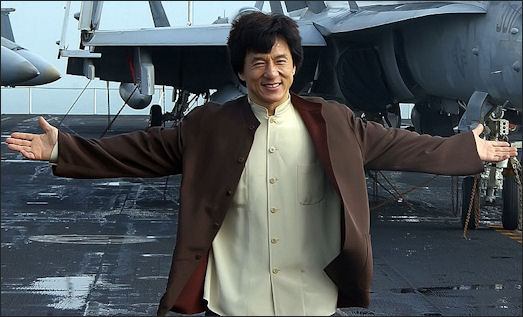
At the age of 17, Jackie left the academy, but he carried Master Ju with him like a ghost for the rest of his life. In his autobiography, he wrote: "Charles Chan was the father of Chan Kong-sang but Ju Yim-yuen was the father of Jackie Chan...I hated you. I feared you. I love you. Master."
Jackie briefly moved to Australia, where his parents had taken up residence while he was a the academy. He worked for a while at the United States embassy there and picked up the name Jackie at a construction site in Canberra (in Hong Kong, he is known as Sing Lung, "already a dragon," a reference to his ambition be become as great as Bruce Lee).
Chan originally had no ambition of acting in films. His opera company sent him to Hong Kong to work in films to make some money because there was no work in the opera. In Hong Kong he worked in the Shaw Brother’s studios. He later told Reuters, “I learned a lot from that period of film making: How to be a stuntman, watching how to be a stunt coordinator from those great film makers. It was those people who were really my teachers when it comes to films.”
Chan became the youngest stunt coordinator at the age of 18. He formed the Jackie Chan Stunt team with 20 actors, many of whom are still involved in his films. Chan also began appearing in action films.
Jackie Chan's Character
Chan told Time: "I spent two thirds of my time abroad, and even when I'm in Hong Kong, my schedule is so full that I barely can find time to be with my wife and child...I think each year: this will be the year I slow down to enjoy the important things in life. Some year. Sometime soon."
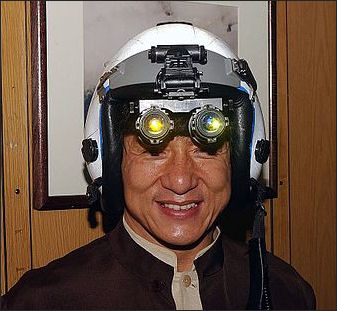
with fighter pilot night vision
goggles on visit to USS Kitty Hawk
Jackie has a reputation fore being a modest, nice guy. He washes his own socks to avoid paying big hotel laundry bills. When he host a party he helps serve he food. In 1986, he founded the Jackie Chan Charity Foundation to help children around the world.
Explaining why there is no foul languages in his films, Chan told Time: "So many children see my movies. All my action films have lots of fighting but no blood. I often ask art directors to put NO SMOKING signs behind me. In Rush Hour, I pick up a newspaper and put it in a trash can. I want to educate children."
Jackie Chan is regarded as one of Hong Kong’s top ten collectors of red wine. He along with basketball player Yao Ming and pianist Lang Lang were selected as goodwill ambassadors for the Shanghai World Expo in 2010.
Although he was reared in Hong Kong by parents who fled mainland China, has been an adamant Chinese patriot and has spoken up in defense of China’s Communist Party . He sang during the closing ceremony of the 2008 Beijing Olympics, and he angrily denounced protesters who sought to interrupt the torch relay. He has spoken out strongly against the pro-independence party in Taiwan and called the 2004 presidential elections there the biggest joke in the world]
Outrage Over Jackie Chan’s Remark
Jackie Chan raised some eyebrows in April 2009 when he said that “Chinese need to be controlled. Before an audience of business leaders on Hainan Island in China he said, “I’m not sure if it’s good to have freedom or not. I’m really confused now. If you’re too free you’re like the way Hong Kong is now. It’s very chaotic. Taiwan is also chaotic...I’m gradually beginning to feel that we Chinese need to be controlled. If we’re not being controlled, we’ll just do what we want.”
Many Chinese were outraged by what Chan said. The response was strongest in Hong Kong and Taiwan. Apple Daily, one of Hong Kong’s biggest newspapers, used its front page to anoint him a knave. Politicians in Taiwan...described him as idiotic and ignorant. Albert Ho, a Hong Kong legislator, called Chan a racist, adding: “People around the world are running their own countries. Why can’t Chinese do the same?” [Source: Andrew Jacobs, New York Timesm April 23, 2009]
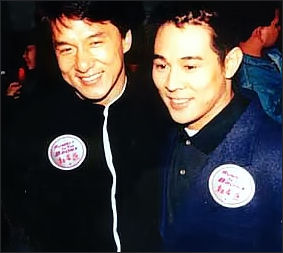
Jackie Chan and Jet Li “On the mainland, a writer published online by The People’s Daily, the Communist Party’s mouthpiece, gave him a thumbs down. I guess Jackie Chan has never experienced the lack of freedom, and has not been cruelly controlled, the commentator, Li Hongbing, wrote.”
As outcry picked up momentum: “the mayor of Taipei, Taiwan’s capital, dropped Chan as an ambassador for the 2009 Summer Deaflympics in Taiwan. The Hong Kong Tourism Board said it would reconsider his role as its most high-profile spokesman. On Facebook, more than 9,700 people threw their weight behind a tongue-in-cheek effort to dispatch Chan to hypercontrolled North Korea.”
“I wouldn’t watch his movies again unless he apologizes,” said Shing Hiu-yi, vice president of the Students’ Union Council at Hong Kong University, one of many groups that have been issuing condemnations and calling for boycotts. What he said was insulting to the Chinese people.
Some suggested that the views voiced by Chan are quietly accepted or embraced by many Chinese. “The Communist Party has long argued that the people of China are ill suited for Western-style democracy. Even many educated Chinese unabashedly insist that the bulk of their brethren are too unschooled or unsophisticated to participate in matters of politics and governing.”
Russell Leigh Moses, a Beijing-based analyst of Chinese politics, told the New York Times that there was a prevailing sentiment in the Chinese-speaking world that too much freedom could only fuel disharmony and instability, viewed as archenemies of China’s drive to put economic development first. “Jackie Chan said those things because he thinks they are true, and there are major sections of society who couldn’t agree with him more,” Moses said. “But such thinking is increasingly out of touch with this simmering debate about what the extent of state authority should be.”
Chan’s remarks provoked some introspection, especially on the Internet. “In a subtle subversion, Yan Lieshan, one of China’s best-known writers, suggested that no amount of government control could help a nation lacking manners and morals. Writing in Southern Weekend, a liberal-leaning newspaper in Guangzhou, Yan bemoaned the neighbors who dump trash on his sidewalk and the cars that speed down his narrow street. How I wish the relevant authorities would come and enforce the rules, but there is no one to control them, he wrote. When you lodge a complaint, no one responds.”
Hu Xingdou, an economics professor at the Beijing Institute of Technology, said he was so infuriated by what he described as Chan’s pandering that he organized a boycott of a concert Chan had scheduled at the Bird’s Nest in Beijing. “It’s easy to sacrifice freedom when you’re treated like a V.I.P. or some high-level official every time you come to China,” Hu, who is known for his tart criticisms, told the situated New York Times. “I’m sure Jackie Chan has never thought about the suffering of the little people who have no power.”
Jackie Chan Businesses and Endorsements
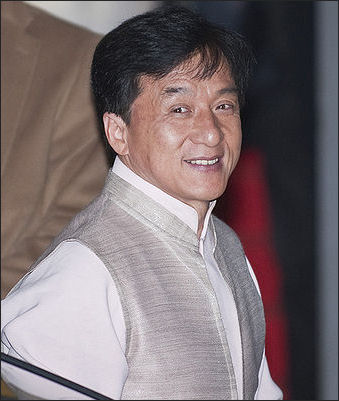
Jackie Chan has a large business empire that includes “Jackie’s Kitchen restaurants, a supermarket, heath clubs, a clothing line, and a sushi eatery chain. He started a chain of cafes, kiosks and carts under the name Jackie’s Java Co. and has a line chocolates and nutritional oatcakes. His goal is to establish a Martha-Stewart-like “total lifestyle branding.” In twenty years he opened car repair shops, gyms, gift stores and restaurant that failed because h wasn’t savvy enough.
Jackie Chan has shamelessly endorsed dozens of products in China, including antivrirus software, electric bikes, sticky rice balls and frozen dumplings. Sometimes its seems like his face beams down from every other billboard and pops up in every other television commercial on the mainland. Outside of China, he has hawked Canon cameras and Hong Kong tourism. Entregroup.com, a popular Chinese entertainment website, ranked him as China’s most recognizable celebrity brand. [Source: Los Angeles Times]
In July 2010, Chan’s choice of products was questioned when it was revealed that an anti-hairloss shampoo he endorsed contained carcinogens. Other “cursed” products endorsed by Chan have included an air conditioner that exploded; an educational tool called the Subor Learning Machine, whose mangers were jailed for fraud; a video CD maker that went bankrupt; a chain of auto repair schools whose owner had a fake diploma; and cola called Fenhuang.
Jackie Chan's Early Love Life
Chan was so busy he had little time for women. "I dated," he said, “But so quick---date, date and boom, gone." Chan said he fell in love with pop-star Tesesa Teng Laikwan. "I loved her," he said in his autobiography, "but I loved myself more. And no heart can serve two masters." Teng died in 1995 at the age of 43 after an asthma attack.
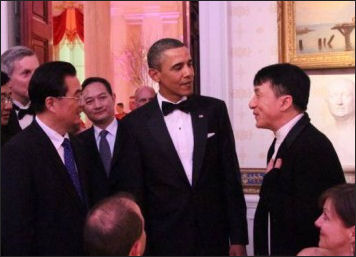
with Obama and Hu Jintao
Chan has been married more than 15 years in a secret marriage to the Taiwan actress Lin Teng-joao. He kept the marriage secret partly because he was worried about the reaction of fans and gangsters. One fan in Japan threw herself in front of a subway when she heard a rumor that he was married. Chan was also concerned that his son might be kidnaped.
Chan said, "She was so nice, quiet and disciplined. She fell in love with me, but I was always fooling around. Then suddenly she told me she was pregnant. She gave up her career and went to Los Angeles to hide. I cared about her. but I did nothing. I didn't know how to love."
"One day, a friend calls me from America and tells me I must come: 'She's getting bigger and bigger.' I said, 'I'm busy.' He says I must come. I go and see her. She tells me, 'You can have your life. I just want our baby to have your name.' I married her, and the next day our son was born then I got on a plane and returned to work."
As time went on Chan realized the importance of spending time with his family. "I love my wife. Now I give her more of myself. I send a jet for her and my son when I'm working. Hong Kong is my home base, but I stay with them in L.A." Chan’s son was 18 in 2001.
Jackie Chan's Son
Jackie Chan’s son Jaycee Chan, who was 24 in 2007, is trying to make it as an actor and singer. Jaycee was born in Los Angeles to Chan and the Taiwanese actress Joan Lin and lives with his father in Hong Kong. but the two don’t see much of each other because of Jackie’s busy schedule.
Jaycee Chan has released an album of songs he mostly wrote himself and appeared in the films The Sun Also Rises by Hong Kong director Jiang Won Chan and Invisible Target directed by Benny Chan. Jaycee looks a lot like his dad. He attended the College of William and Mary in Virginia but didn’t graduate, saying “all you can see in Virginia is sheep.”
Jackie Chan's Roles Films
Jackie Chan usually plays a comic warrior and a determined underdog who overcomes adversity and gets outs of scraps in long choreographed fight scenes. Chan's ex-bodyguard Low Houi-kang told Time, "Bruce Lee fights till the end. But Jackie Chan sneaks out if he knows he's losing. It is an attitude that Hong Kong people relate to---being strategically smart."
Chan said, "I hate violence. In my movies. I want to show my fans that I love action, but not violence." He also said "I love to make people laugh. I was always happy-go-lucky. When I was young, I would make fun of myself when the master was hitting me."

Jackie Chan Stunts and Choreography
Jackie Chan is famous for his stunts and the injuries he has sustained while doing stunts. He often does films while wearing cast and the best part of many of his films are the closing credits, in which he is shown screwing up and injuring himself in out takes.
Jackie Chan has leapt from a building onto a bus and then into another building. He has plunged down a hill in a giant beach ball; skied off a mountain onto a helicopter runner (“First Strike”); jumped off a 21-story building and slide down its 45̊ incline (“Who Am I?”); free-fallen from a plane into a hot-air balloon; and leapt from a 50-foot clock tower head first. Many of his most spectacular stunts are performed without a safety net.
Chan has also jumped off mountain tops, leapt from cliffs into hot-air balloons, hung from a speeding bus on the end of an umbrella, flown over cities while hanging onto to a rope ladder dangling from a helicopter, and leapt 26 feet from a roof top to a balcony on the top of a multi-story building..
Chan plans and choreographs most his stunts himself. His movies often take six to eight months to shoot (long by Hong Kong standards) because he takes so long to prepare his stunts. "I always control the scenes," he told Time. "It's not like somebody designs them for me. I am the stunt director and my team has been with me for 15 years. I know I'm crazy but I won't risk my life."
Chan’s fight scenes are often inspired more by classic silent comedians such as Buster Keaton and Harold Lloyd than fighters like Bruce Lee. In regards to copying movies from other actors, Chan told Newsweek: "Even Stallone, he say: 'Jackie when I don't have an idea, I just watch your videotapes.' Yeah, he did! But I copy many American movie. Everybody copy somebody."
Jackie Chan's Injuries
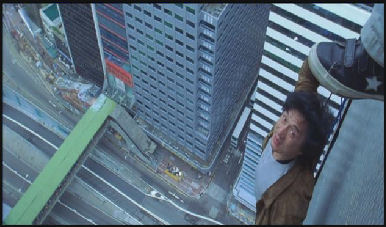
Preparing for stunt in Police Story
Jackie Chan has had scores of injuries and broken numerous bones. He broke his nose three times (“Young Master, Project A” and “Mr. Nice Guy”), his ankle once, most of his fingers, both cheekbones and his skull. He dislocated his shoulder in “City Hunter” and broke a vertebrae in “Police Story”. In “Drunken Master” he nearly lost an eye.
Chan has a hole in his head from the film “Armour of God”, when he suffered a brain hemorrhage sustained in Yugoslavia when he missed a leap onto tree, fell, and hit his head on a rock. He had to have brain surgery. In “Rumble in the Bronx”, he broke his ankle making a leap and shot much of the film while in a cast. Chan said, "I use out takes [at the end of his films] to show my fans that I get hurt. This isn't cartoon.”
When asked how long he can keep it up, Chan told Time, "I don't know. I always think something will happen to me. An accident is an accident. If I break my ankle, click, I just snap it back. I have so many scars."
Jackie Chan's Hong Kong Films
Since 1976, Jackie Chan has made more than 70 films in Hong Kong, starring in more than 40 of them, including the “Supercop” series, the “Drunken Master” series, the “Police Story” series and “Crime Story”. The fight scenes are more memorable than the plots.
Chan had small roles in the Bruce Lee films “The Chinese Connection” (1972) and “Enter he Dragon” (1973). Chan's first films were directed by Lo Wei, the man who directed Bruce Lee in “Fist of Fury”. He wanted Chan to be just like Lee.
In the 1978 hits “Snake in Eagle's Shadow” and “Drunken Master”, Chan developed his affable screen persona that he maintains today. Chan said, "I never wanted to be the next the next Bruce Lee. I don’t want people being killed and lots of blood in my movies. I had my own style. When I became famous, I learned that children learn from me. So I create action that looks like ballet. And I put humor in my films."
On Hong Kong itself, Chan told Newsweek, "Sometimes I think Hong Kong is too free and people are too selfish. Punishment for crime isn't tough enough. If I was the punishment captain in Hong Kong and I caught a rapist, I would take him to the center of the city and hit him 10 times in public, then I would shoot him right away. We need some more punishment."
At the time of the 1997 handover, Jackie Chan told Time, "The Chinese government welcomes Jackie Chan movies because there's no violence, no sex and no politics. My life and my profession will not change after the handover. But had I not been Jackie Chan, I might have considered leaving."
Jackie Chan's Classic Hong Kong Films
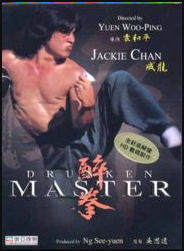
“Police Story” (1985) featured the famous bus and department store scenes and brought Chan to the New York Film Festival. Chan said, "This is definitely the favorite action movie I've ever made, a huge hit with audiences. So big that I've made three sequels.”
On “Miracles” (1989), he said, "This doesn't match Police Story for action, but it has much more that I'm proud of, both as an actor, and, especially, as a director."
“Drunken Master II” (1994) was the first Jackie Chan movie widely released in China and the largest grossing film in 1994 in China. "The fight scenes in this film include some of my favorite choreography," Chan said.
On “Killer Meteor” (1977), Chan said, "This one of the worst movies I've ever made. It took years to be released, and I wish it has never been made at all.
Jackie Chan's Hollywood Films
In the early 1980s, Chan came to America and appeared in “Cannonball Run” (1981), with Burt Reynolds and Jackie Gleason, as well as forgotten films like “The Protector” and “The Big Brawl”(1980). Describing his lack of early success in the United States, Chan said, "I lose face. It doesn't work. I big star in Asia. In Hollywood nobody knows me. I go back to Asia to do my own work." On “Cannonball Run”, he said, "Not a movie that shows off my best skills."
In 1996, Chan returned to America to film “Rumble in the Bronx”, a cheesie $15 million film with good action, an improbable and weak plot and snow-capped mountain behind New York City (the film was shot in Vancouver). Rumble in the Bronx grossed $10 million in the first two days after its release earned more than $32 million in the United States alone.
Hollywood breakthrough came in 1998 with the film “Rush Hour”, in which he appeared with the American black actor and stand up comic Chris Tucker. It earned $33 million in it first week and $84 million in its first 17 days, and over $250 million worldwide. Rush Hour II was one of the biggest hits of the summer of 2001. Rush Hour was set in Los Angeles. “Rush Hour II” was set in Hong Kong. “Rush Hour III” was shot in Paris, New York City and Los Angeles. The first one was better than the sequels.
Chan also appeared in “Shanghai Noon”, a Western with Owen Wilson and Lucy Liu, and its sequel “Shanghai Knights”. He appeared in “The Tuzedo”, a special effects drama produced by Steven Spielberg. In that film he plays a cab driver that comes in the possession of a tuxedo that gives him magical powers.
In regards to his future in Hollywood, Jackie Chan told Newsweek, "I just want to learn. A chance to get close to James Cameroon, Steven Spielberg, George Lucas. If they approve me to do something, I do it for free. I want to learn what is a special effect. On American movie, the actor stand against a blue background and do something and when the movie comes out there's explosion in the air. I ask, 'How they do that?' I only know the physical stunt."
Jackie Chan's Later Films
In 2003, at the age of 48, Chan admitted that he had started using stunt doubles. He said, “I will use stunt doubles if you ask me to ride on an F-16 jet fighter, or jump over a series of hurdles with a crazy horse, or perform two 720-degree somersaults.” Then added, “[If the script calls for] one somersault, I’ll do it myself.” Around the same time Chan began saying that he was he was more interested in making films that feature acting rather action.
Jackie Chan is involved with a Chinese television search for new action movie talent called “Descendants of the Dragon”. The show appeared from March to October 2007 with 10 winners appearing a movie produced by Chan,
Chan has also shot films in Japan, South Africa, the Netherlands, Turkey and Australia. Hong Kong-made “Rob-B-Hood” was scheduled for release in autumn 2006. The Chinese government banned Chan’s 2008 film, “Shinjuku Incident”, because of excessive violence. It was about Chinese immigrants abused by Japanese gangsters in Tokyo
Jackie Chan played a serious role in the 2010 remake of “Karate Kid”. He played the stern Han, the Miyagi character, and got relatively good marks for from critics. He said, “I’m very happy to act in a different role. It’s not just a comedy, but a serious role” and added that such roles are rarely offered to him.
"1911," Jackie Chan’s revolutionary film epic released in 2011, hews to the orthodox depiction of Sun Yat-sen favored by films tailored for the mainland market: a heroic, mythic figure. The film tells the story of the resentment of the majority Han Chinese toward the ruling Manchu minority and the bloody road to a republic. It features Chan as codirector and star in a movie packed with action scenes and a catalogue of historical figures that for the uninitiated require footnotes. Chan plays Huang Xing, Sun Yatsen's deputy, one of the founders of the Kuomintang and the revolution's military leader.

Jackie Chan and Jet Li
The 2008 film “The Forbidden Kingdom” was the first film to feature Jackie Chan and Jet Li together, with Jackie Chan playing the Drunken Master Lu Yan and Jet Li playing the Silent Monk, both based on roles from their classic films. Shot entirely in China, in locations varying from city streets to the Gobi Desert, the film is about an American teenager that is transported to a storybook version of ancient China, where he meets with several traveling companions (including Chan’s and Li’s characters) to challenge the Jade Warlord, a supernaturally powerful warlord.
The fight scenes were choreographed by Yuen Woo-Ping, who worked with Chan on his first moves but hadn’t worked with him in more than 30 years. He was chosen because he was the one guy respected by both Chan and Li.
Director if the film Rob Minkoff told the Daily Yomiuri, “A week before shooting the movie, both of them told me that they are scared to death and they wanted to get out. They called their managers and said, “Can we get out? And the managers said, “It’s too late; we cashed the check.” Bringing them together in first place he was no piece of cake. “You have like those two giant nations suddenly ramming together to try to do a merger...It’s just an overwhelmingly complicated and difficult to deal with.”
“You have the two largest movie stars in Asia---largest martial arts stars particularly...All the customary things that they would get suddenly are challenged. Who’s gonna to get first billing, who’s gonna get second billing, who’s gonna get this, who’s gonna get that?..You had to make sure that they were going to be treated equally, because the truth is, the two of them had an enormous amount to lose if this didn’t work.”
On Jackie Chan and Jet Li, Time film critic Richard Corliss wrote: “For all the safety precautions taken, the two stars still have to give every fiber of their disciplined, battered bodies to get through the kung-fu scenes. It’s what made them action stars to begin with: the willingness to display their physical gifts while undergoing something like physical torture. In a phrase macho masochism.”
In his blog Chan said, the scenes were expected to take all day but were completed in a couple of hours. “The short sparring that lasted a few moves went very smoothly. It was like lightning with a brother from the same school of martial arts. We blended easily on every move, be it on terms of timing or rhythm.
“Chinese Zodiac 2012"--- Jackie Chan’s Last Big Action Movie
In November 2012, Reuters reported: “Kung Fu superstar Jackie Chan said that while the upcoming film "Chinese Zodiac 2012" will be his last major action movie, citing his increasing age, he will still be packing punches in the world of philanthropy. Chan wrote, directed and produced his latest film, set to premiere in cinemas in China next month. He also plays the lead role and said that he regarded it the "best film for myself" in the last ten years. [Source: Reuters, November 20, 2012]
"I'm the director, I'm the writer, I'm the producer, I'm the action director, almost everything," the 58-year-old Hong Kong actor told Reuters while in Beijing to film a documentary. "This really, really is my baby. You know, I've been writing the script for seven years," and the film took a year and half to make, he added.
In the film, Chan is a treasure hunter seeking to repatriate sculpture heads of the 12 animals of the Chinese zodiac, which were taken from Beijing's Summer Palace by French and British forces during the Opium Wars. He said it was an important movie for him because it will be his last major action feature, although he insisted it is not the end of his action career. "I'm not young any more, honestly," he said, noting that with special effects technology and doubles a lot can be done without physical risk. "Why (do) I have to use my own life to still do these kind of things?" he said. "I will still do as much as I can. But I just don't want to risk my life to sit in a wheelchair, that's all."
Chan was recently awarded the Social Philanthropist of the Year award by Harpers Bazaar magazine. He said he wanted to increase time devoted to charitable work and hoped China's leagues of newly wealthy will follow his example - which he underlined by auctioning a Bentley 666 for around 6 million yuan. China now has more billionaires than any other Asian country, but very few philanthropic organizations, and giving to charity remains a relatively new phenomenon in the world's most populous country. Chan said while Chinese philanthropists have made some encouraging strides, much more still needs to be done - a task made harder by the Internet, with netizens willing to leap on every perceived wrong move. "Right now people (must) very, very be careful, but that doesn't stop them to want to do the charity. I think it's a good sign," Chan said.
Jackie Chan: “I Want to Be a Chinese Communist Party Member”
In July 2021, Jackie Chan said in a speech that he wants to be a Chinese Communist Party member. Rebecca Davis wrote in Variety: “Jackie Chan has long been one of Hong Kong’s celebrities who most frequently and prominently engages in propaganda efforts for the mainland’s ruling Communist Party, but he recently took his public devotion to the Chinese regime to a new level. Chan declared his admiration for the Party at a symposium organized by the China Film Association to “study and implement the spirit” of a keynote speech delivered by Chinese President Xi Jinping. [Source: Rebecca Davis, Variety, July 14, 2021
“Abroad they often say, ‘proud to be Chinese.’ I’m very lucky to be a Chinese person, but I also am very jealous that you all are Party members. I just think the Chinese Communist Party is really so magnificent,” he said, according to video footage from official broadcaster CCTV. “What the Party says, what it promises, it doesn’t need 100 years to accomplish — it will definitely accomplish it in just a few decades. I want to be a Party member!” His declaration was followed by a strong round of applause.
“Xi’s hourlong address, delivered on July 1, marked the 100th anniversary of the Party’s founding with hardline talk about China’s rise, including the message that the country will no longer be “bullied” by other countries, and that anyone attempting to do so would “bash their heads bloody against a Great Wall of steel.” Earlier, Chan participated center stage in an enormous propaganda spectacle event put on by the Party at Beijing’s 91,000-capacity Bird’s Nest national stadium, best known abroad as the location of the 2008 Olympics opening ceremony.
Chan performed on the stage during a performance titled "The Great Journey'. In the star-studded show shown by state broadcaster CCTV, Chan sang a part of the “Yellow River Cantata,” a classic patriotic work composed during the Second Sino-Japanese War. The Hong Kong actor joined forces with Taiwanese singer Angela Chang and Liu Naiqi, a tenor from Macau, to sing: “Defend your hometown, defend the Yellow River… defend all of China!” They were accompanied by thousands of performers dressed as soldiers from the Eighth Route Army, a military group under Communist Party command during that conflict in the late ’30s and ’40s.
The performance took place the same day that scores of people in his native Hong Kong were arrested to prevent demonstrations against the Party’s increasing control over the territory. Speaking a week after the performance’s release at the July 8 China Film Association meeting, Chan said he admired the Eighth Route Army’s verve. “Those soldiers faced down machine guns while wearing straw sandals and using single-shot pistols, and confronted their advanced weaponry with swords and spears. I think the Eight Route Army of our Communist Party is truly amazing!”
According to Business Insider: Some Weibo users questioned Chan's "moral character," citing incidences of his infidelity and his son Jaycee's drug offenses, saying it would disqualify him from becoming a Party member. "He might love the country and be hardworking, but he has character problems. It's better if he doesn't join the party," said one user with the ID Zhuozhuo Drolma. Some Weibo users were critical of Chan's lack of faithfulness in his marriage. In a 2015 memoir, he admitted he'd had an affair with actress Elaine Ng and had a child out of wedlock. According to the Chinese media outlet China Daily, the process of obtaining Communist Party membership involves a detailed vetting procedure that takes into account one's ideology, character, and personal history. Chan does not currently hold membership in the Communist Party. He is, however, a delegate in the Chinese People's Political Consultative Conference (CPPCC), a Chinese government advisory body. [Source: Cheryl The, Business Insider, July 14, 2021]
Chan expressed support for China's crackdown on Hong Kong's pro-democracy protests in 2019. The South China Morning Post reported that Chan's comments in Beijing prompted ire from fans in Hong Kong once again, some of whom wrote on Twitter that they wish to "un-enjoy every one of his movies."
Image Sources: Wikipedia, Wiki Common and Jackie Chan Fist website,
Text Sources: New York Times, Washington Post, Los Angeles Times, Times of London, National Geographic, The New Yorker, Time, Newsweek, Reuters, AP, Lonely Planet Guides, Compton’s Encyclopedia and various books and other publications.
Last updated December 2021
